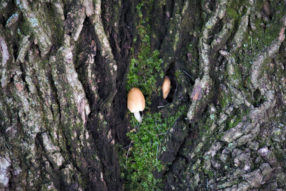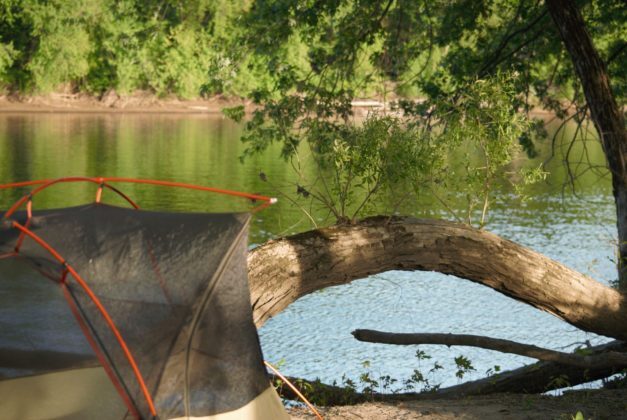There are some people-related reasons for why not everyone feels safe outdoors, and there are others trying to change this reality from shifting who gets represented as belonging in these spaces, to providing guidelines for how to intervene.
What are some of those other things that interfere with safety and comfort, and are somewhat-to-very possible to be encountered in Hartford? Let’s just list the anxieties:
- Mosquitoes
- Deer ticks
- Bees
- Poison Ivy
- Killer trees
- Thunderstorms
- Heat exhaustion
- Hypothermia
- Dehydration
- Tripping
- Sun burns
- Drowning
- Getting lost
 Solving/Mitigation/Preventing
Solving/Mitigation/Preventing
There is no way to prevent all risk in life, but there are some actions you can take to minimize harm and discomfort while in the wilds of Hartford, and none of them require ordering from expensive outdoors stores:
- Drink water: You can get dehydrated year round, which might not seem obvious, but think about what happens to hair and skin in the winter. For a couple hours locally, you don’t need to pack like you’re going on an expedition. Drink water before leaving. Bring a full water bottle with you. Drink more water when you get home. Unless you’re making your outing during a heatwave or doing something especially intense, that should do it.
- Wear long sleeves and pants: Put a barrier between yourself and mosquitoes. Make nasty ticks work harder if they want to grab onto you! The less skin exposed, the less risk you run of sunburn and poison ivy. Tip: leggings are not the best for warding off mosquitoes because of how thin the material is — either go for a thicker cloth or a make sure the clothing doesn’t cling to you.
- Wear a hat: Keeps the sun and rain off your face while keeping insects away. This does not work when wearing a Yankees cap.
- Look where you’re going: Look up to see if there are broken branches or obvious dead trees that can come crashing down. Look down to avoid tripping over ruts, tree roots, rocks, and other obstacles. Look ahead to know if the terrain is about to change AKA if you are about to fall into a ditch. Look around to see if there is poison ivy along the trail, in the trail, growing on the tree you were about to lean against. Look down to make sure you’re not about to step into a pile of coyote poop in the path. Also, just look to see all the awesome things out there. Unfamiliar with the area? Bring a map.
- Know your limits: Don’t be that hormone-fueled idiot who has to prove he’s the fastest or can do the most extreme things. Seriously. If you’re not a great swimmer, stay out of the Connecticut River or other bodies of water that have currents. If you’re not a good swimmer, probably not the best idea to be in any water without a lifeguard. Don’t walk beyond the end of your driveway? Expand your range slowly. Do it and challenge yourself, but don’t set yourself up for failure and/or misery and/or blisters by setting out on a ten mile jaunt the first day.
 Pay attention to weather reports: Our trees have taken a bruising the last few years because of drought and insects — being in the woods when there are high winds is not wise. Check the weather to avoid being surprised by this or thunderstorms. You don’t have to dodge all activity when the weather conditions aren’t “ideal,” just keep alert and possibly shift those plans. Go to the neighborhood park instead of all the way across town so you aren’t stranded in a hailstorm. I know this sounds basic, and it is, but weather does not have to ruin anything if you adjust expectations and be prepared by dressing appropriately and making sacrifices, like not standing under a tree in a thunderstorm. Climate, on the other hand, that’s a scarier topic to dive into.
Pay attention to weather reports: Our trees have taken a bruising the last few years because of drought and insects — being in the woods when there are high winds is not wise. Check the weather to avoid being surprised by this or thunderstorms. You don’t have to dodge all activity when the weather conditions aren’t “ideal,” just keep alert and possibly shift those plans. Go to the neighborhood park instead of all the way across town so you aren’t stranded in a hailstorm. I know this sounds basic, and it is, but weather does not have to ruin anything if you adjust expectations and be prepared by dressing appropriately and making sacrifices, like not standing under a tree in a thunderstorm. Climate, on the other hand, that’s a scarier topic to dive into.- Dress for the season, dress for comfort: Think it might rain in the afternoon? Pick clothing that won’t be uncomfortable to wear if it gets drenched. Hear reports that the temperatures will be very, very cold? If you wear enough layers you can spend at least some time outdoors without dying or wishing you were. Wear shoes that fit well, and if you can’t bring yourself to make reasonable footwear choices (1) don’t come crying to me, and (2) at minimum rotate between different styles of wrong shoes so that you spread that discomfort around rather than create one stunner of a problem. One more thing: stay away from cloying scents and heavy perfumes when going into nature. If you smell like a flower, don’t be surprised when you attract bees.
- Sunscreen: This is for everybody. Something mineral-based (zinc oxide) won’t sweat right off, making it effective at doing its job.
 Shower: I’m not suggesting you hop in the shower every time you walk on the paths in a local park, but if you’ve done any off-roading where you might have encountered poison ivy or ticks, yeah, you probably should. If you know you’ve walked through poison ivy or been in a tick-infested area, I’d suggest stripping down the second you get home, tossing those clothes directly into the washing machine, and then hitting the shower. You don’t want the plant oils rubbing onto anything else, or to have a tick to fall off in the house where it may find you or a pet later when you’re least expecting it.
Shower: I’m not suggesting you hop in the shower every time you walk on the paths in a local park, but if you’ve done any off-roading where you might have encountered poison ivy or ticks, yeah, you probably should. If you know you’ve walked through poison ivy or been in a tick-infested area, I’d suggest stripping down the second you get home, tossing those clothes directly into the washing machine, and then hitting the shower. You don’t want the plant oils rubbing onto anything else, or to have a tick to fall off in the house where it may find you or a pet later when you’re least expecting it.- Jewelweed: Those who are especially susceptible to getting rashes should know about jewelweed. The US Forest Service says: “When applied topically, sap from the stem and leaves is said to relieve itching and pain from a variety of ailments, including hives, poison ivy, stinging nettle, and other skin sores and irritations. The sap has also been shown to have anti-fungal properties and can be used to treat athlete’s foot.” One reader said he carries it with him when he goes into the woods, crushing and applying it to his skin to avoid breaking out from poison ivy. Fun fact: It often grows right next to the stinging nettles and poison ivy. Oh, you’ve never heard of stinging nettles? Add that to the list of things to worry about. You decide if stinging nettle is more or less of an asshole than poison ivy. Or, wear long pants and never know what its burn feels like.
As for other wildlife encounters, animals are usually going to actively move away from or simply ignore you. This has been my experience, locally, with the exception of a few overly friendly squirrels in Bushnell Park. People get pumped up when there are bear sightings. The bears are after their next bird seed fix. Leave them alone. These aren’t grizzlies or polar bears. They don’t care about you. An off-leash dog is more of a threat than any of these other critters. That said, if an animal is acting funny, don’t get yourself an appointment for a tetanus or rabies shot. Move away from it.

